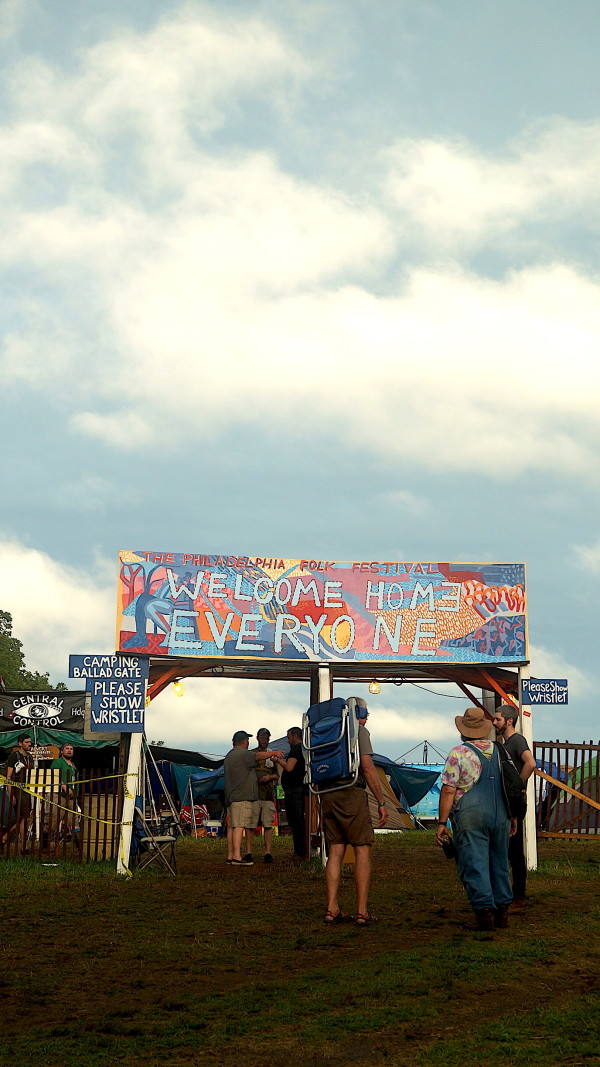Photo by ALICE KRIEG
There aren’t too many folk festivals in this part of the country, and certainly not many that have the benefit of as much built-up knowledge, tradition, and custom as the Philadelphia Folk Festival. Because the festival has been put on every year for the past 56 years at the Old Pool Farm in Schwenksville by the Philadelphia Folksong Society, these traditions give the Philly Folk Fest a gravitas not accessible to younger music festivals. There are mysteries to it, set pieces that seem bewildering to newcomers and outsiders; many familiar faces are perhaps not even sure why these traditions exist, only that it would feel wrong to have a Fest without the Friends of Bill W. gathering every evening, without the Give-and-Take Jugglers in Dulcimer Grove, or without the hangover-curing pancake mornings.
Like traditional music, the culture of Folk Fest is handed down from generation to generation. It is probably one of the few literally family-friendly music festivals in its class. Small children run around underfoot and babies are toted from campsite to stage grounds in cradleboards. Youths come of age at the folk festival, having first kisses, first drinks, first all night music sessions. Those who have grown up and grown old already share their knowledge, their lore, and their music with the younger generations. And somehow everyone seems to get along, even if the sky opens up and everyone has to crowd into the food tent or the beer garden for a few hours, cheek-by-jowl. You just grin and wait for the music to come back on the main stage.
Of course, beyond age, there are social stratifications. You have the day trippers and the campers. The volunteers and the paying guests. The heavy campers and the light campers. The friends of fest and everyone else. Each have their own roles here, and their own traditions. While these differences are occasionally cause for drama, the unified purpose — Fest — means that tensions are easily looked past for the broader experience.
For just what is Fest? Because it’s not just the tents, the merch tables, the food trucks, or the sponsors. It’s not even just the music, though the music is everywhere from the main stage to the shady groves, inescapable, like water for fish. Fest is not just the people that come for an afternoon, or for a lifetime, to make a tableau of stories and ideas. Fest it seems, is somehow all of these combined into a tapestry of arts, culture, music, and dance that has to be seen to be believed, and must be experienced to be understood. There are certainly plenty of opportunities for those unaffiliated with the Philadelphia Folk Festival to begin, and while the years of institutional memory can seem daunting to an outsider, everyone there is happy to see a newcomer step in and join the fun.
This year, there was an undercurrent running through the Festival that I had never noticed before, one of protest and resistance. Not to any internal authority, mind, but to the political climate of the outside world. Some artists chose not to notice it, and I don’t blame them. For many people, the Folk Fest is a way of escaping the buzz and grnd of the real world, so to hear direct references to it, like the MC making jokes about Bannon’s firing, were jarring, even when they were appropriate. What I will say is that the artist that chose to cover Buffalo Springfield’s “For What It’s Worth” knew what they were doing. The woman singing that people needed to work together knew what she was doing. Even Old Crow Medicine Show’s front-to-back cover of Blonde On Blonde had a political ring to, harkening back to a somehow more turbulent decade.
There aren’t many genres of music quite as political as folk music. Hip-hop and Rock music all have their roots in the African-American struggle, but have lately been so commoditized by the music industry that they can’t take any risks in speaking up politically. Classical music hasn’t been political for a hundred years. Metal and electronic music I’m sure both have revolutionary artists, but none come to my mind. However, when I think of folk music I think of bluesmen describing their toils. I think of the men of this country who rode the rails and fought the fascists. I think of the music of cultures struggling under the weight of imperialism and not giving in, the spirit of rising together, working together for a common good. — CHRIS MALENEY

